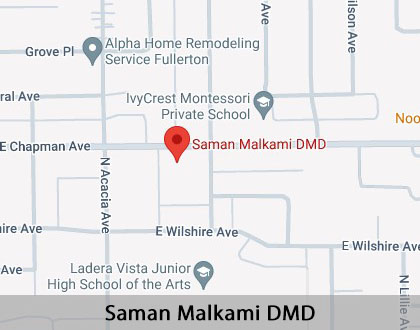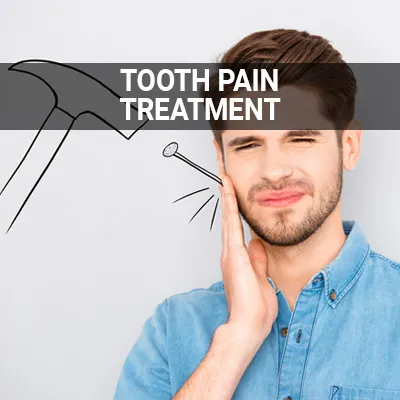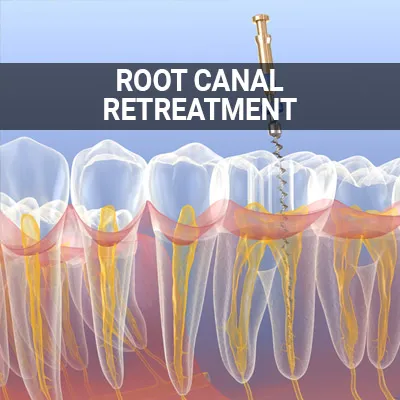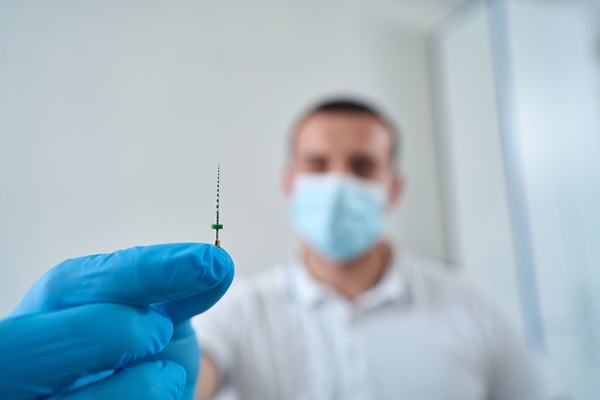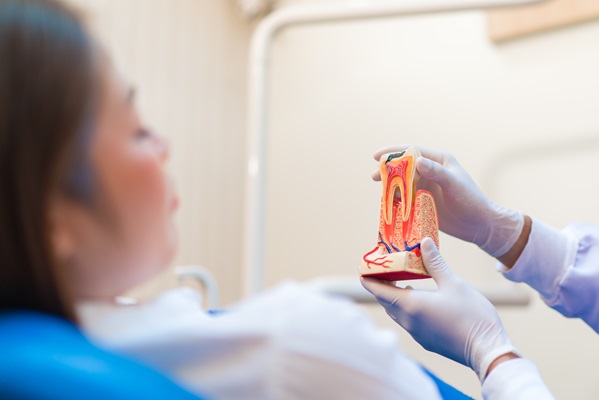Root Canal Aftercare Fullerton, CA
Root canal aftercare is essential for a treated tooth, which may be sensitive and vulnerable to dental problems for a while. Root canal aftercare involves the postprocedural treatment of pain and swelling and dental hygiene maintenance. Therefore, it is critical to know what happens during the root canal and the steps to take after the procedure.
Information about root canal aftercare is available at Saman Malkami DMD in Fullerton and the surrounding area. We want to make sure you are comfortable during and after the procedure. Call us at (714) 459-8002 to schedule an appointment.
What to Expect During the Procedure
Despite what some patients fear, a root canal remains a relatively painless process because patients receive a local anesthetic. Endodontists perform root canals, which typically require 2-3 office visits. An endodontist is a dentist that has special training in diagnosing tooth pain and treating ailments that affect the pulp, the material inside the tooth. In addition, they are skilled in pain management and are able to make the procedure very comfortable for the patient. Although patients experience some discomfort afterward, root canal aftercare will aid in healing.
“An endodontist is a dentist that has special training in diagnosing tooth pain and treating ailments that affect the pulp, the material inside the tooth.”
During the Root Canal Procedure
A root canal consists of several phases. The first occurs before the procedure when the dentist takes an X-ray of the tooth and adjacent bone. Also, the patient receives a local anesthetic via a needle in the tooth and surrounding gums. Finally, the endodontist places a thin latex rubber sheet over the tooth to protect it from moisture, bacteria, and other substances inside the mouth.
Once the tooth and surrounding area are completely numb, the endodontist makes a hole at the top of the tooth and then removes the nerve and material inside each root. This removal constitutes the root canal, which also involves cleaning and disinfecting inside the tooth and roots. Then, the endodontist fills the tooth's interior with a rubber-like filling to protect against infection and fixes a temporary filling on top.
After the root canal, the patient goes home and gives the tooth time to heal. They will need to return as soon as possible to get a crown or permanent filling to replace the temporary one. The endodontist might need to insert a plastic or metal post to support the crown and tooth during the follow-up visit.
“After the root canal, the patient goes home and gives the tooth time to heal.”
After the Procedure
Before the patient returns to the dentist's office, they will get root canal aftercare instructions from their endodontist. Postprocedural care will help you avoid complications from treatment. It is crucial that patients understand the instructions and follow them carefully.
After the root canal, the patient will still feel numb in the affected area. Do not eat or chew anything until the numbness wears off to avoid biting the tongue or the inside of the mouth. The patient should expect to feel sensitivity and tenderness for a few days.
The dentist can prescribe antibiotics to prevent infection and pain medication for any discomfort. However, patients should use care and follow all instructions that come with prescription or over-the-counter drugs. Some medicines can cause drowsiness and can interfere with a patient's ability to operate machinery safely.
“Postprocedural care will help you avoid complications from treatment.”
Check out what others are saying about our dental services on Yelp: Root Canal Aftercare in Fullerton, CA
Possible Complications
Though rare, patients may experience postprocedural complications after a root canal. According to the American Association of Endodontists, a patient should contact their endodontist immediately if they detect any of the following:
- Allergic reaction to a medication
- Any symptoms experienced before the root canal
- Dislodging of the filling or crown
- Persistent swelling, pressure, or pain
- Uneven bite
“Though rare, patients may experience postprocedural complications after a root canal.”
Questions Answered on This Page
Q. What happens during a root canal?
Q. What should patients do after a root canal?
Q. What postprocedural complications need attention?
Q. What can patients do to maintain tooth health?
People Also Ask
Q. What are the symptoms of a tooth infection?
Q. How does an endodontist save teeth?
Q. How do I know if I need a root canal retreatment?
Q. When does a patient need a root canal?
Continued Hygiene and Care
Flossing and twice-daily brushing are essential to maintain the tooth's health. Also, regular check-ups and dental cleanings will help keep teeth strong. A treated tooth can last for a lifetime. However, another root canal might be necessary after several months or years. Retreatment is often needed when pain or swelling develops or if the affected tooth does not heal the way it should.
“…regular check-ups and dental cleanings will help keep teeth strong.”
Frequently Asked Questions
Q. What is an endodontist?
A. An endodontist treats dental pain and the internal parts of teeth, mainly the pulp. Endodontists are dentists who received specialized training in this area. Less than 3% of dentists are endodontists.
Q. What is a root canal?
A. Patients receive a root canal when they have a severely infected, injured, or decayed tooth. After drilling a hole at the top, the endodontist removes the internal tissue called the pulp. After cleaning and disinfecting, the endodontist then attaches a temporary filling on top, replaced by a crown or permanent filling at a later office visit.
Q. Is a root canal painful?
A. It is a common myth that root canals are very painful and uncomfortable. Fortunately, the use of local anesthesia makes the procedures virtually pain-free. Patients will likely experience minimal pain and swelling after a root canal, but the proper aftercare minimizes postprocedural discomfort.
Q. What complications might come from a root canal?
A. With proper root canal aftercare, complications from the procedure are not common. However, patients should contact their endodontist as soon as possible if they notice continued swelling and pain. Other problems might include sensitivity to hot or cold, uneven bite, or an allergic reaction to a medication.
Q. What should I do to prepare for the procedure?
A. Our team advises patients to eat before the procedure and brush and floss. Do not smoke or drink alcohol for a day prior to the root canal. If you are planning on being sedated for the procedure, we recommend you arrange for a friend to drive you home after.
Start Feeling Better – Visit Us Today
By visiting us as soon as possible, our team can help get you the professional treatment you need. Instead of waiting around and allowing the symptoms to get worse, we can provide you with treatment options.
Definitions
Learn More About Root Canal Aftercare
It is generally a myth that root canals are extremely painful. Most of the time, the procedure only causes minor discomfort afterward. Nevertheless, root canals are essential treatments for teeth that have become injured, infected, or decayed. Moreover, root canals can help patients save their teeth instead of having to extract them.
Contact Saman Malkami DMD in Fullerton for more information about root canal aftercare. You can call us at 714-459-8002 for more information about scheduling a root canal.
Helpful Related Links
- American Association of Endodontists. Post Treatment Care. 2024
- Cleveland Clinic. Root Canal. 2024
- Drugs.com. Root Canal. 2024
- Healthline. Pain After Root Canal. 2024
- News Medical Life Sciences. Recovery After Root Canal Treatment. 2024
- New Mouth. Root Canal Procedure. 2024
- NHS. Root canal treatment. 2024
- WebMD. Dental Health and Root Canals. 2024
About our business, license, and website security
- We accept the following payment methods: American Express, Cash, Check, Discover, MasterCard, and Visa
- We serve patients from the following counties: Orange County
- We serve patients from the following cities: Fullerton, Placentia, Anaheim, Anaheim Hills, Yorba Linda, Buena Park, Brea, Orange, Irvine, Tustin, Newport Beach, West Minister, Garden Grove, Whittier, Fountain Valley, and Long Beach
- CA (License #51168). View License Information and Specifics
- National Provider Identifier Database (1205909132). View NPI Registry Information
- Healthgrades. View Background Information and Reviews
- Norton Safe Web. View Details
- Trend Micro Site Safety Center. View Details
Back to top of Root Canal Aftercare

